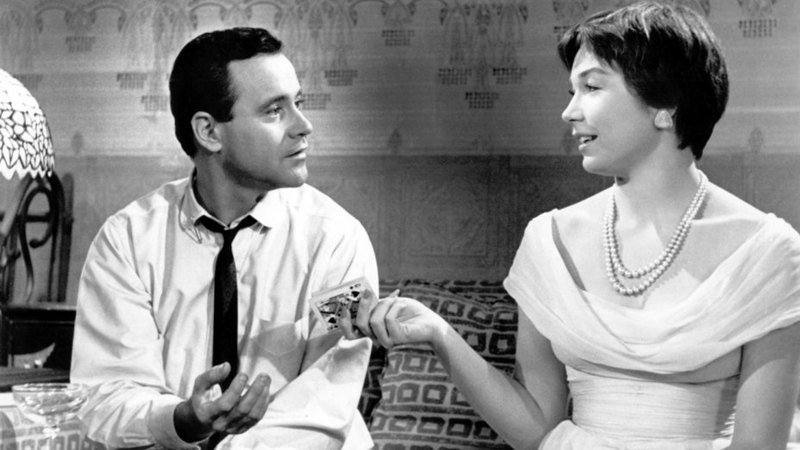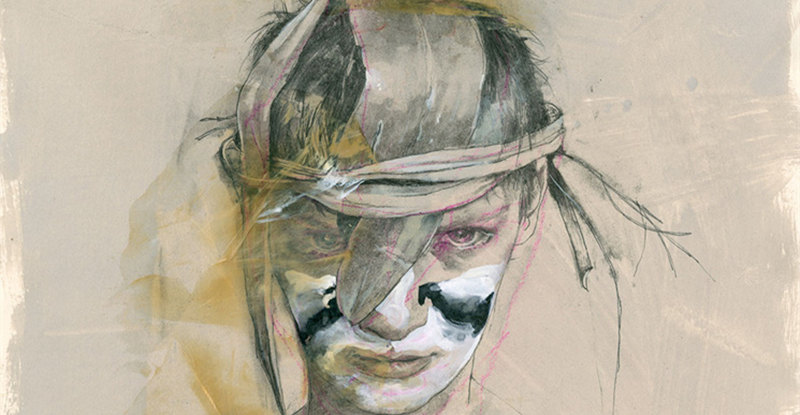“Uh. Words. Uh. Words. Uh huh huh huh.”
-Butthead, from Beavis and Butthead in “Beard Boys”
I’m all but certain that “Pontypool” is the only zombie movie that references both Norman Mailer and Roland Barthes. But that’s only one of several qualities that mark “Pontypool” as one of the most unique zombie movies ever made, none more prominent than the fact that it’s not exactly a zombie movie. It’s got its share of shambling, semi-mindless, carnivorous creatures but they’re never referred to as zombies or anything else. Director Bruce McDonald and writer Tony Burgess (not the “Clockwork Orange” Tony Burgess) refer to them as “conversationalists” but that’s off the record. Furthermore, until the end we hardly even see them. Instead we only hear about them which is not just a nifty cost-cutting measure but also an integral part of the story.
“Pontypool” is set almost entirely in a tiny radio station in a rural Ontario town (Pontypool) where morning talk show host Grant Mazzy (Stephen McHattie) has been exiled due presumably to past transgressions on his previous big city gig. With his cowboy hat and self-conscious attempts to provoke the audience (“A pissed off listener doesn’t change the station”), he comes off as the Canadian Don Imus. His show is even called “Mazzy in the Morning.”
Grant tries his best to spice up the dull morning news (It’s cold. It’s snowing. Someone’s cat is missing.) to the consternation of his producer Sydney Briar (Lisa Houle.) His job is made a whole lot easier for him when news starts to dribble in about crowds of people who have gathered around the offices of Dr. John Mendez. Why? Nobody knows, but they pile into the building en masse until it actually ruptures. Soon reports of other wandering crowds begin to pour in with stories of mass slaughter and cannibalism and other pretty nasty stuff. With no hard data, all that Grant, Sydney and engineer Laurel-Ann (Georgina Reilly) have to rely on are the words dribbling in from the Internet or from frantic callers. And words, as we soon learn, are the last things we can trust.
The film is based on Burgess’ novel “Pontypool Changes Everything” and it’s a mighty strange beast, an intellectual B-movie that offers equal parts semiotics and projectile gore. In its post-Romero form, the zombie genre almost always centers on a virulent outbreak of some kind but in this case, the form of transmission is unique: language. In George Bataille’s view, language is essentially a form of contagion in which ideas (germs) are passed from one person to the next. Words also have arbitrary meanings attached to them (the word “cat” could mean “mountain” after all, there’s nothing inherently feline about the collection of letters) and it’s this lattice work of signs and signifiers that provides the means to humanity’s destruction (Words can kill) in “Pontypool.”
The film’s clever tagline is “Shut up or die” and it’s meant literally. The “conversationalists” thrive on words and the ideas attached to them though, in what I assume is a peculiarly Canadian joke, it is only the English language that is currently infected (“Parlez-vous Français?”) What happens when you take away a radio talk show host’s words? If only we could find out in Dittohead Nation.
If this sounds a bit dry, it’s not at all. “Pontypool” is a proud B-picture which wavers between thriller and comedy territory (more the latter, but it’s a fine balance) and delivers its fair share of surprises. There are some genuinely creepy moments too. Just think about the spectacle of a mass of hungry undead chanting the same words over and over again with no sign of comprehension (“Death panels! Death panels!”) Ultimately “Pontypool” develops into a “Rio Bravo” style siege, but never loses its wit or focus in the transition from talk to action.
In what is essentially a three person show, all the performances are excellent. McHattie’s gravelly voice and drawn features make him a compelling screen presence and he has great chemistry with the witty, confident Lisa Houle. They have to deliver some pretty challenging lines (this is a movie about the collapse of meaning in language) and they handle them with aplomb. Reilly doesn’t have as large of a role but she absolutely shines in one complex sequence which would have flummoxed many topline actors.
One of the stupidest things about film criticism is that critics usually write about a movie just days (or even hours) after seeing it for the first time. When I initially saw “Pontypool” at the Toronto International Film Festival (TIFF) a few years ago, I was put off by the film’s ambiguously coded shifts in tone. Was this part serious? Was this one a joke? For some reason, I also wrote that it featured “uneven performances” and “mediocre execution.” WTF? Those words have no meaning to me today now that I’ve had a chance to revisit the film on DVD. “Pontypool” is smart, funny, thoroughly entertaining, and unlike anything else in the zombie genre.
VIDEO
The film is presented in a 2.35:1 anamorphic transfer. The transfer looks very strong and consistent to me. The picture looks dark in general but it’s filmed in a poorly-lit basement studio so I assume that’s how it’s meant to be.
AUDIO
The DVD is presented in Dolby Digital 5.1. The sound design is subtly complex here with lots of off-screen dialogue (or “conversationalist” babbling) playing an important role in the film. The mix juggles it all well. Optional English and Spanish subtitles support the English and eventually French dialogue.
EXTRAS
First the big negative. As with most IFC releases, this comes with several FORCED TRAILERS. You cannot skip them by going to the menu or even fast-forward on most DVD players. Forced trailers are an insult to every renter or buyer. And the few studios that shove them down viewers’ throats today should be ashamed. Big points off on the Extras rating for this.
The film is accompanied with a commentary track by the director and writer. I only listened to the first half hour or so. McDonald and Burgess are pretty gossipy and talk more about the film’s origins rather than providing a scene-by-scene analysis which isn’t such a bad thing, I suppose.
The DVD also includes the original radio play of “Pontypool” which was recorded to help secure funding for the feature film. It adheres pretty closely to the film’s script and is presented here along with stills from the movie.
Three short films are also provided, and I’m not sure what connection the first two have to “Pontypool” except that the director is Canadian. There are two shorts by director Britt Randle: “Eve” (2002, 12 min.) and “Dada Dum” (2007, 8 min.) I enjoyed both which can probably be best described as Lynchian. The third short is also a Canadian film: “The Death of Chet Baker” (2009, 8 min.) directed by Robert Budreau and starring Stephen McHattie in the title role. It’s a speculation about the mysterious death of the great jazz singer and I wasn’t knocked out by it, but I’m pretty sure now I can watch McHattie in anything.
A theatrical trailer and international trailer are also included.
FILM VALUE
“Pontypool” has acquired enough of a cult following that two sequels are in the work with “Pontypool Changes” scheduled for later this year. Another TIFF debut, perhaps? According to McDonald and Burgess on the commentary track, the films will depict the outbreak from other perspectives with people listening to Grant on the radio and so forth. I’m looking forward to them. If you count it as part of the genre (and I think you should), “Pontypool” is one of the best and most innovative zombie movies ever made.


